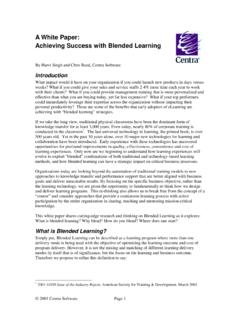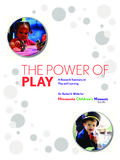Transcription of A Review of Theoretical and Empirical Literature - Unresolved
1 21A Review ofTheoretical andEmpirical Literature Unresolved IssuesSince 1978 the theory of transformative learning , as defined by JackMezirow (1978a,b; 1981; 1989; 1990; 1991a,b; 1992; 1994a,b;1995; 1996, 1997), has stimulated much discussion and analysis inthe field of adult education. This scrutiny has generally manifesteditself in two forms, that of Theoretical critique and Empirical , most of the published discussion of Mezirow s workhas been predominantly Theoretical critiques and the empiricalstudies have been generally available only as dissertations or con-ference proceedings (Taylor 1995; 1997a). Furthermore, most ofthe Empirical studies focus on the model and the inherent com-ponents of a perspective transformation, whereas the theoreticalcritiques center on issues related to transformative learning under-lying constructs about learning .
2 Rarely have these two forms of in-quiry been explored in concert with each other, reflecting on howeach together informs our understanding the nature of transfor-mative learning . It is the intent of this section of the monograph todo just that, identify and discuss the major Theoretical and em-pirical tensions associated with transformative learning specifically, seven areas of contention emerge from theliterature:CIndividual change vs. social actionCDecontextualized view of learningCUniversal model of adult learningCAdult development: shift or progressionCAn emphasis on rationalityCOther ways of knowingCPerspective transformation: the modelBefore beginning this section it is important to understand how thestudies were selected for this Review and their overall strengths andReview of Literature22 The most controversialissue concerning trans-formative learning theoryhas been its relationship tosocial action and power.
3 Limitations. Over 44 studies were selected, each of them focusingon Mezirow s transformative learning theory directly (for a more in-depth explanation of selection criteria refer to Taylor 1997a). Thispurposeful sample of studies allowed for a more consistent inter-pretation, whereby all the studies were critiqued within a sharedframework. The strengths of these studies are (1) the large numberthat have been brought together in this monograph and the con-sistency of their findings about the issues identified; and (2) thepredominance of dissertations, which generally involve a rigorousreview by a committee of experienced colleagues. On the otherhand there are limitations: (1) they are predominantly qualitative,limiting their generalizability; (2) most were carried out in retro-spect, where participants reflected back on their transformativeexperience, as opposed to observing and recording the learningexperience as it was actually happening; and (3) most failed toreview previous studies involving transformative learning theory,offering little critique of each other s work.
4 Regardless of theirstrengths or weakness, these studies move the discussion of trans-formative learning theory to a new level, that of the Empirical inconjunction with the Theoretical , offering not a finality to the dis-cussion, but a new perspective and a more in-depth understandingabout a profound movement in the study of adult this section the first issues discussed focus predominantly on thetheoretical framework of transformative learning theory whereaslater the focus is specifically on Unresolved issues associated withthe model of a perspective transformation. Also, each section isfollowed by a collection of reflective notes and questions with theintent to situate the Theoretical in the practical. My hope is that,with an identification of Unresolved issues, the practitioner oftransformative pedagogy will be better informed about the under-lying assumptions of transformative learning theory and how theycan be explored within the context of fostering vs.
5 Social ChangeThe most controversial issue concerning transformative learningtheory has been its relationship to social action and power (Collardand Law 1989; Cunningham 1992; Griffin 1987; Hart 1990;Newman 1993, 1994). Much of the problem begins with Mezirow sattempt to fuse transformative learning with the epistemology ofREVIEW OF LITERATURE23 Habermas critical learning theory. In particular, it is the emphasison social change framed within Habermas epistemology of eman-cipatory knowing, that of knowledge derived from humankind sdesire to achieve emancipation from domination. However, Collardand Law (1989) see it as the lack of a coherent, comprehensivetheory of social change, a lack diffused throughout the internalstructure of this theory, evident in his selective interpretation andadaptation of Habermas, and partially dependent on problemswithin Habermas own work (p.)
6 102). More specifically, it is theemphasis on transformation of the individual within the context ofsocial action. Perspective transformation appears to focus on theindividual examining her or his own personal experience .. aboutunderstanding and changing oneself .. [and accepting] a reinte-gration by the individual into a society where the dominant ideol-ogy may go unquestioned (Newman 1993, p. 229). This emphasisallows for a greater detachment from the inherent political andsocial action associated with emancipatory , it seems that Mezirow is attempting to locateemancipatory education within the context of a liberal democraticsystem, thus not recognizing the sociopolitical critique from whichemancipatory education was given birth. It is his failure to addressadequately questions of context, ideology, and the radical needsembodied in popular struggles [that] denies perspectivetransformation the power of emancipatory theory (Collard andLaw 1989, pp.
7 105-106). Furthermore, in Coffman s (1989, 1991)study on the promotion of inclusive language and perspectivetransformation among seminary students, she found that Mezirow does not adequately accommodate the possibility of thetransformation of society based on the perspective transformationof individuals who are members of a group (1991, p. 52). It is thetransformation within a group context that gives individuals morecourage to initiate social change within new response, Mezirow (1989) believes that the choice of socialaction resides with the learner. It is dependent upon whether thedistortions that are being critically reflected upon are of an indi-vidual or sociocultural nature and it is not that he fails to recognizecollective and social transformation, but instead, sees it as a sepa-rate entity from individual transformation.
8 Transformative learn-ing is profoundly intersubjective, but it is not exclusively groupmediated (p. 173). It is through focusing exclusively on socio-cultural distortions that Mezirow is most critical. Furthermore, hebelieves it is important to recognize the variety of situations wheretransformative learning can take place outside the context of socialaction: Review of Literature24 There can be no simple linear relationship between transforma-tive learning and social action; there are many kinds of trans-formative learning and many kinds of social action. Transfor-mative learning experiences which result in changes that areepistemic and psychic may not logically lead to collective actionat all and may only very indirectly be a product of a specificsocial practice or institutionalized ideology.
9 (Mezirow 1989,p. 174)Tennant (1993) supports Mezirow, because he believes his theoryis directed at the intersection of the individual and social (p. 36),not just the individual as others advocate. He states that a per-spective transformation is a change in perspective of the individual,not society, such that it shifts the onus for social analysis onto thelearner, so that it is grounded in the learner s experience, ratherthan being a decontextualized theory of society generated by, andfor, academe (p. 37). However, Tennant does concur thatMezirow does not give enough attention to the influence of socialforces and how they shape our lives, particularly concerning thesocial dimension of adult in this issue of social dimension and transformativelearning is a related force Mezirow overlooks, that of power.
10 Hart(1990) is critical of transformative learning s association withemancipatory education, in particular how Mezirow s treatment ofHabermas categories of learning ( , instrumental, communica-tive) severs the systematic and intrinsic relationship of Habermas theory with a critique of power (p. 126). She believes thatMezirow implies a power-free form of communication, and by doingso, fails to recognize the inherent distorting effect of power withincommunication that has to be addressed for critical reflection totake place. By framing his theory within Habermas learning do-mains, Mezirow takes on their conceptual baggage. Whether helikes it or not, by employing these categories Mezirow takes overtheir meanings and connotations as well and therefore inevitablygets tangled up with the issue of power (p.)









